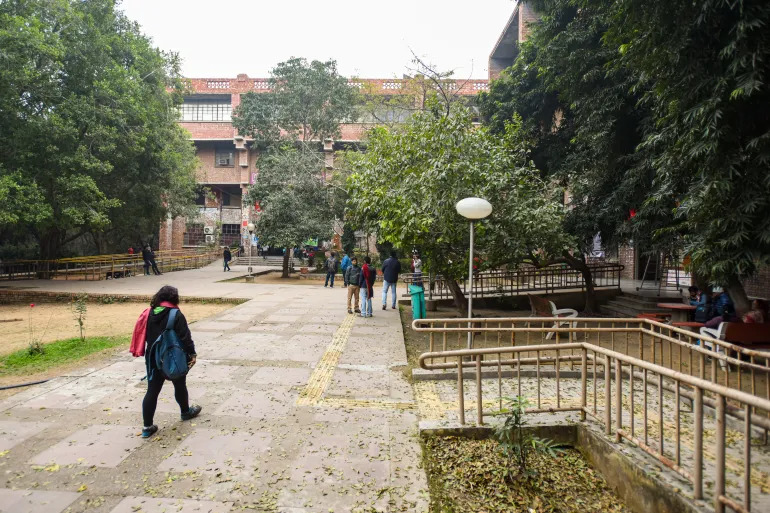New Delhi, India – For two years, Afghan student Yasmeen Azimi has been trying to get a visa to resume her studies in India. But the 22-year-old from Kabul says her visa application has been rejected thrice.
Azimi was admitted to a postgraduate programme to study political science at Chandigarh University in northern Punjab state in January 2021 under a scholarship provided by the Indian Council for Cultural Relations (ICCR), an autonomous body under the foreign ministry.
But her plans to pursue her education in India were dashed after India’s Ministry of External Affairs (MEA) cancelled all existing Afghan visas, including student visas, following the Taliban takeover of Afghanistan in August 2021.
As her visa process dragged on, Azimi eventually joined her course online, but eight months after starting, her results are still pending, despite making repeated requests to university authorities.
“There is no positive response. We cannot continue our studies this way,” said Azimi, who also faced difficulties in attending online classes as the internet was frequently choppy.
Her problems began on August 25, 2021, when India’s Ministry of Home Affairs (MHA) released a statement announcing: “Keeping in view some reports that certain passports of Afghan nationals have been misplaced, previously issued visas to all Afghan nationals, who are presently not in India, stand invalidated with immediate effect.”
The Indian government also closed down its Kabul embassy as diplomatic ties were broken following the Taliban capture of the Afghan capital. Last August, New Delhi resumed limited operations at its embassy but visa facilities are still unavailable.

E-visa programme
New Delhi instead directed Afghan nationals to apply under an e-visa programme – but this is only valid for six months and granted in rare circumstances.
Last year, e-visas were given to only 300 Afghans, which means Azimi and thousands of other Afghans, who visit India for studying or medical treatment, have been made to wait.
E-visas are easy to apply for and require basic documents such as business cards, ID and invitation letters from an institution in India.
But more than 2,500 Afghan students enrolled in Indian universities and colleges are stuck in Afghanistan due to not being issued visas, according to the Afghan embassy in New Delhi.
India’s ICCR, founded in 1950 to promote cultural exchanges, previously offered 1,000 annual scholarships to Afghan nationals who wanted to pursue undergraduate and postgraduate studies in India, in a bid to forge closer relations with the Western-backed government that took over Kabul after the 2001 toppling of the Taliban.
Thousands of Afghans benefitted from the scholarship scheme, which offered up to 25,000 Indian rupees ($302) as a stipend and about 6,500 rupees ($73) as house rent per month to each student. More than 10,000 Afghan students are currently studying in various universities across India.
Azimi had hoped that her education would help her find a job and improve her family’s financial situation back in Afghanistan amid an unprecedented humanitarian crisis, with more than 90 percent of people living below the poverty line.
Her father, a driver by profession, wanted her to go to India for a better future.
“My family was very much at peace that I would find some opportunity outside India after my degree when I will be educated,” she told Al Jazeera.
Azimi has still not received any results from Chandigarh University, despite repeated requests.
An official from the international student wing of Chandigarh University told her they were trying to resolve the issue with authorities. A university official told Al Jazeera they were also working on this issue.
‘No choice but to leave her course’
Another Afghan student, Meena Nizami, frustrated by the denial of a visa and the lack of response from Indian institutions, told Al Jazeera she no longer wants to return to the country where she had lived since the age of 12.
Nizami, 22, who pursued a master’s in psychology at the University of Delhi, was forced to return to Afghanistan following the coronavirus outbreak in December 2020. She took online classes and hoped to eventually return to the university – but this has not happened.
Nizami paid about 60,000 rupees ($811) in course fees for the first year, but university staff said that they would be unable to do anything as it was a matter of “national security”.
“This is frustrating and unexpected. We did not expect this from India at least. No student should suffer in terms of accessing education,” Nizami said.
“It is unfortunate that a political shift has led India to treat us so badly. They should have supported women’s education at least and let them enter the country.”
After waiting for a year, Nizami had no choice but to leave her course – and has now been admitted to Westford University College in the United Arab Emirates.
Like her, many other Afghan students have started applying to universities elsewhere, including in Europe, Turkey, Iran and Pakistan.
In 2022, Pakistan announced 4,500 scholarships for Afghan students and more than 7,000 Afghans are currently enrolled in various graduate and postgraduate programmes in Pakistan, according to the Pakistan government.
Shifa Noor*, 26, from Kabul, was pursuing a master’s in business administration (MBA) from an Indian university while her husband, Haider, was a PhD scholar. Both of them are now stuck in Afghanistan due to the visa issue. They requested anonymity for this story.
Noor says education was her only means to achieve a better future. She says studying in Afghanistan for women is now almost impossible as the Taliban has banned girls from schools and universities, and imposed curbs on their employment.
Noor’s family has no income as Afghanistan’s economy has ground to a halt amid international sanctions. Her father, a former government employee, lost his job following the fall of the Western-backed government.
“I wanted to complete my degree as soon as possible but now I am thinking of leaving the course and joining some other university outside India,” Noor said.
Onib Dadgar, a PhD student in Computer Science at the prominent Jawaharlal Nehru University in New Delhi, has become an advocate for Afghan students.
The 30-year-old, who is currently living in Iran, reached out to India’s Ministry of Home Affairs but said the ministry did not respond. He has also run campaigns on social media like Twitter.
Dadgar said Gujarat Technical University (GTU) last year cancelled the admission of 24 Afghan engineering students citing visa issues.
A GTU official based in Ahmedabad justified the cancellation, saying the university was following norms set by the ICCR, which had offered them scholarships.
“You may please contact ICCR, GTU follows the norms of ICCR. If ICCR raises any question we will resolve it,” Khushboo Chauhan, administrative assistant for foreign students at GTU, told Al Jazeera via email.
Al Jazeera contacted other ICCR officials, including Nalini Singhal, scholarship policy and admissions programme director, but received no response. Another ICCR official refused to provide any information regarding the cancellation of admissions.
Meanwhile, the education of hundreds of Afghan students has been interrupted.
“We thought India was our second home but it left us alone,” Dadgar told Al Jazeera from Iran by phone.
Source : AlJazeera









